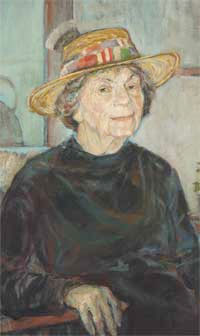
In the spring 2012 semester, 11 students in Assistant Professor Patricia Pedroza’s Women’s and Gender capstone course, which explores the question, “What is activism?” launched a project to explore local social activist Granny D’s work and legacy. Their basic intention was to gather a group of people together whose discussion would generate several perspectives on one topic—in this case, Granny D. The students collected oral histories from people who knew the iconic activist, and videotaped many of them. Once those video interviews are edited, they will be available on the project’s website, Catching up with Granny D.
The capstone class was also intended to explore concepts of gender and politics, Dr. Pedroza explained, and “why people get involved in civic engagement … specifically how we may motivate our undergraduate students to get involved.”
One of the capstone students, Hannah Walker, did a reading from one of Granny D’s books at a book signing in Keene with Granny D’s co-author, May Dennis Burke. “It was a great experience, and I got in contact with some interesting social activists in the Keene area,” Hannah remembered. “The cross-generational connections I made were probably the best part of it because those people are very determined to see their message continued through younger people. Although the audience we read for was small in Keene, at the Peterborough location there were quite a few people who were either friends of Granny D or believed in her message.”
The Granny D Project has special resonance on campus, since the Mason Library holds the activist’s archives.

This election year ALL college and university students in NH should become activists, since the voter ID law is a direct attack on students’ voting rights. In 2012 a student ID will be accepted at the polls, but next year that will no longer be the case.
I have been told that in the last 20+ years there has been one case of voting fraud, when a man tried to impersonate his dead father. Voting fraud of this kind has never been a problem in NH. The purpose of this law is a blatant attempt to keep voters from the polls (“it’s not worth the trouble”), and especially the potentially uncomfortable young and old voters who will not sleepwalk after the Republican majority that enacted this law.
I don’t understand how the voter ID law is any way oppressive. I need to show a driver’s license, state issued ID (in place of a driver’s license) or passport to do many functions in today’s society.
Below is a partial list of things requiring ID:
1. Boarding an airplane
2. Writing a check
3. Cashing a check
4. Using a credit card (in many areas)
5. Driving a motor vehicle
6. Applying for permission to hold a protest or rally
7. Securing employment
8. Purchasing a house or real estate
9. Renting a home or apartment
10. Renting a car
11. Purchasing a firearm (Includes BB guns)
12. Applying for a fishing license (waived for 16 and 17 year olds when their legal guardian provides a photo ID)
13. Purchasing alcoholic beverages
14. Purchasing tobacco or products that contain nicotine
15. Purchasing a motor vehicle
16. Initial registration of a motor vehicle
17. Receiving prescription medicine
18. Purchasing OTC medicine that contains pseudoephedrine
19. Getting a bank account
20. Leaving or entering the USA (legally).
Please explain why adding the verification and protection of one of our country’s most sacred things (voting in our democratic republic) should not receive the same protection as boarding an airplane or cashing a check…?
This “argument” seems to have many holes. Regina, please present a well thought out counter-point. I would love to read it. As math teachers say: “please show all work for solving this problem”.